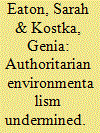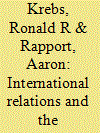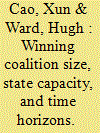|
|
|
Sort Order |
|
|
|
Items / Page
|
|
|
|
|
|
|
| Srl | Item |
| 1 |
ID:
132949


|
|
|
|
|
| Publication |
2014.
|
| Summary/Abstract |
China's national leaders see restructuring and diversification away from resource-based, energy intensive industries as central goals in the coming years. On the basis of extensive fieldwork in China between 2010 and 2012, we suggest that the high turnover of leading cadres at the local level may hinder state-led greening growth initiatives. Frequent cadre turnover is intended primarily to keep local Party secretaries and mayors on the move in order to promote the implementation of central directives. While rotation does seem to aid implementation by reducing coordination problems, there are also significant downsides to local leaders changing office every three to four years. Officials with short time horizons are likely to choose the path of least resistance in selecting quick, low-quality approaches to the implementation of environmental policies. We conclude that the perverse effects of local officials' short time horizons give reason to doubt the more optimistic claims about the advantages of China's model of environmental authoritarianism.
|
|
|
|
|
|
|
|
|
|
|
|
|
|
|
|
| 2 |
ID:
118159


|
|
|
|
|
| Publication |
2012.
|
| Summary/Abstract |
Theories of international relations have often incorporated assumptions about time horizons-a metaphor for how heavily actors value the future relative to the present. However, they have not built on a growing body of experimental research that studies how human beings actually make intertemporal tradeoffs. In this article, we present relevant findings from psychology and behavioral economics, notably those of "construal level theory" (CLT), and explore these findings' implications for three classic questions-international cooperation, preventive war, and coercion. We argue that experimental evidence regarding how people discount future value and construe future events challenges the conventional wisdom on international cooperation. We further maintain that CLT helps explain a longstanding puzzle about preventive wars-namely why they are often initiated too late by declining powers but too soon by rising competitors. Finally, we rely on these findings to explain who wins coercive contests and why compellence is often, but not always, harder than deterrence. Scholars of international relations often embed in their theories crucial assumptions about time horizons, and this article seeks to show what differences it makes if we ground these assumptions in what we know about actual human decision making.
|
|
|
|
|
|
|
|
|
|
|
|
|
|
|
|
| 3 |
ID:
139528


|
|
|
|
|
| Summary/Abstract |
Selectorate theory proposes that authoritarian regimes supply fewer public goods than democracies. Smaller winning coalitions make it less costly for autocracies to maintain support among critical groups by providing private goods. Democracies, with large winning coalitions, find it cheaper to provide public goods. In contrast, we argue for a conditional effect of winning coalition size on public good provisions: Many public goods require considerable state capacity to plan, legislate, and implement. Moreover, leaders with short-term horizons are unlikely to invest in public goods that take considerable time to provide. Therefore, our modified selectorate theory suggests that governments will provide public goods if the size of the winning coalition is large enough, state capacity is great enough, and a priori regime durability is long enough. We test our theory on air pollution. While selectorate theory receives little empirical support, our findings cohere with modified selectorate theory. In particular, core democracies—defined as those with large winning coalitions, considerable state capacity, and high regime stability—perform better than autocracies in controlling air pollution.
|
|
|
|
|
|
|
|
|
|
|
|
|
|
|
|
|
|
|
|
|